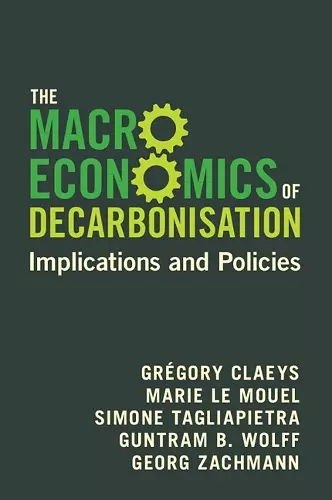The Macroeconomics of Decarbonisation
Implications and Policies
Gregory Claeys author Simone Tagliapietra author Guntram B Wolff author Marie Le Mouel author Georg Zachmann author
Format:Paperback
Publisher:Cambridge University Press
Published:8th Feb '24
Currently unavailable, and unfortunately no date known when it will be back
This paperback is available in another edition too:
- Hardback£80.00(9781009438360)

This book provides all the necessary elements to understand the macroeconomic implications of decarbonisation.
This book provides a rigorous and accessible portrayal of the macroeconomics of decarbonisation. The book is written in the form of a textbook so to be accessible to a wide readership. It adopts a simple language, avoiding jargon. Each chapter includes a set of key takeaways.Decarbonisation is the reduction of carbon dioxide emissions using low carbon power sources, lowering output of greenhouse gasses into the atmosphere. This is essential to meet global temperature standards set by international climate agreements. To limit global warming to 1.5°C, hence avoiding the worst-case scenarios predicted by climate science, the world economy must rapidly reduce its emissions and reach climate neutrality within the next three decades. This will not be an easy journey. Shifting away from carbon-intensive production will require a historic transformation of the structure of our economies. Written by a team of academics linked to the European think tank Bruegel, The Macroeconomics of Decarbonisation provides a guide to the macroeconomic fundamentals of decarbonisation. It identifies the major economic transformations, both over the long- and short-run, and the roadblocks requiring policy intervention. It proposes a macroeconomic policy agenda for decarbonisation to achieve the climate goals of the international community.
'The authors provide a unique insight into the short and long-term economic implications of decarbonisation, applying a rigorous and thorough approach to assessing the multidimensional facets of the transition. A 'must-read' for policymakers and the private sector whose combined mobilisation will be essential to achieve climate neutrality by 2050.' Alexandra Dimitrijevic, Managing Director, Global Head of Research, S&P Global Ratings
'Climate action carries risks. In contrast to the devastating consequences of climate change, however, they remain manageable. The Macroeconomics of Decarbonisation, authored by distinguished thought leaders, unravels intricate dynamics underpinning the shift toward climate neutrality. If you are eager to explore advanced climate economics in a clear, accessible language, this guide is an essential read.' Ottmar Edenhofer, Director and Chief Economist, Potsdam Institute for Climate Impact Research
'An important book on one of the defining challenges of our time. Getting the green transition right requires understanding the various macroeconomic implications of decarbonisation on industries, jobs and budgets, and putting in place ambitious policies to drive it forward. This book sheds light on how it can be done.' Paolo Gentiloni, Commissioner for the Economy, European Commission and Former Prime Minister of Italy
'If you ever dreamed to understand what economists think and know about climate policies without the technicalities, here is the book you absolutely need to read! It is clear, comprehensive and powerful.' Christian Gollier, Managing Director, Toulouse School of Economics
'Achieving net zero will have profound macroeconomic implications from distributional consequences and debt sustainability concerns necessitating fiscal adjustments to stranded assets impacting financial stability. These are just some of the topics covered in this excellent and comprehensive textbook. A must-read for all who want to meaningfully participate in the public debate on green transition!' Beata Javorcik, Chief Economist, European Bank for Reconstruction and Development
'The Macroeconomics of Decarbonisation is a rare, solutions-oriented look at the intersection of the clean energy transition and the systemic change that underpins it. From fostering large-scale innovation and spurring green market creation to accelerating sustainable finance, it lifts the curtain on the critical policy interventions necessary to pursue a clean, future-oriented and resilient growth model.' Ann Mettler, Vice-President Europe, Breakthrough Energy
'Covering all the macroeconomic implications of climate policy in just one book seems impossible but the authors come very close. Comprehensive and well-grounded, yet accessible to a broader audience, this book takes the reader on a journey through the various economic effects of decarbonisation. With this thorough account, the authors fill an important gap!' Sabine Mauderer, Member of the Executive Board, Deutsche Bundesbank
'Some may wonder whether there's a need another book about climate change, given the hundreds that have now been produced. The answer in this case is 'yes,' because this new work by a set of talented researchers at Bruegel, the highly-regarded Brussels think tank, and others, provides a perspective which is decidedly macroeconomic, and thus complements rather than duplicates the vast majority of the existing literature. Faculty, students, policy makers, and the broader public will find useful insights about the great challenges we face.' Robert N. Stavins , A. J. Meyer Professor of Energy and Economic Development, John F. Kennedy School of Government, Harvard University
'Meeting the objectives of the Paris Agreement will involve an unprecedented mobilisation of resources and a fundamental rewiring of our economies. Designing effective and fair policies to make this possible requires deep theoretical understanding, which this excellent book provides. It is an essential guide for policymakers and climate campaigners everywhere.' Laurence Tubiana, CEO, European Climate Foundation
'The climate transition is the first policy induced industrial revolution, impacting all segments of the economy and raising as many policy issues. The book offers a broad and accessible overview of the current state of the question in a way that is relevant to both experts and people looking for a good introduction on the macroeconomics of decarbonisation.' Pierre Wunsch, Governor of the National Bank of Belgium
'[T]he authors have done a great job of explaining the various macroeconomic aspects of decarbonization in a simple but not simplistic manner. … Highly recommended.' A. A. Batabyal, Choice
ISBN: 9781009438391
Dimensions: 228mm x 150mm x 18mm
Weight: 500g
346 pages